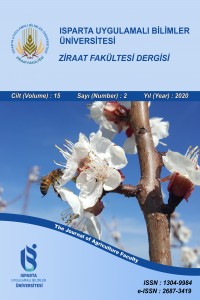Abstract
Çalışma, Nijerya'da sorgumun gıda güvenliğini 1961 ile 2018 yılları arasında değişen yıllık zaman serisi verilerini kullanarak incelemiştir. Veriler FAO veri tabanından alınmıştır ve toplanan veriler hem tanımlayıcı hem de çıkarımsal istatistikler kullanılarak analiz edilmiştir. Ampirik bulgular, sorgum üretimindeki artışı etkileyen ana faktörün üretkenlikten ziyade alan genişlemesi olduğu göz önüne alındığında, rejimler geçişi boyunca üretim büyüme performansı zayıf olduğundan sorgumun yetim bir ürün olduğunu göstermiştir. Buna ek olarak, rejim değişiklikleri içinde ve arasında ortalama üretimdeki değişimden sorumlu ana faktör, alandaki artıştı. Rejim kaymaları arasındaki ortalama üretimdeki dalgalanmanın alan riski ve belirsizlikten, yani belirsizlikten kaynaklandığı gözlendi. hava durumu değişkenleri. Çiftçilerin arazi tahsis kararının hem kurumsal hem de kurumsal olmayan faktörler tarafından yönetildiği tespit edilmiştir. Ayrıca, sorgum üretiminin gelecekteki gıda güvenliği umut verici değildir, çünkü üretim, alandaki hafif artış nedeniyle hafif bir artışla işaretlenecektir, çünkü üretkenlik eğilimdeki marjinal artışla işaretlenecektir. Bu nedenle sorgumun gıda güvensizliği, ülkenin çok yönlü amaçları nedeniyle içereceği bir başka zamanlama bombasıdır. Bu nedenle, politika yapıcıların ülke ekonomisini etkileyecek olan ithalatı önlemek için acil adımlar atması gerekiyor.
References
- sorghum production among sorghum farmers in Kwara State Nigeria. Global Journal of Current Research, 1(4):116-123. Ahmed, S.I. and Joshi, M.B.(2013).Analysis of instability and growth rate of cotton in three district of Marathwada. International Journal of Statistika and Mathematika, 6(3):121- 124 Ayalew, B.(2015).Supply response of maize in Ethiopia: co-integration and vector error correction approach. Trends in Agricultural Economics, 8 (1):13-20
Abstract
The study examined the food security of sorghum in Nigeria using annual time series data that ranged from 1961 to 2018. The data were sourced from the FAO data base and the collected data were analyzed using both descriptive and inferential statistics. The empirical findings showed sorghum to be an orphan crop as the production growth performance throughout the regimes shift was poor given that area expansion rather than productivity was the major factor that influenced increase in the production of sorghum. In addition, increase in area was the major factor responsible for change in average production within and between the regime shifts. It was observed that fluctuation in the average production between the regime shifts was caused by area risk and uncertainty viz. weather vagaries. It was established that acreage allocation decision of the farmers was governed by both institutional and non-institutional factors. Furthermore, the future food security of sorghum production is not promising as the production will be marked by gentle rise owing to gentle rise in area as productivity will be marked by marginal increase in trend. Therefore, the food insecurity of sorghum is another timing-bomb which the country will contain with given its versatile purposes. Thus, the policymakers need to take urgent steps to avert impending importation which will affect the country’s economy.
References
- sorghum production among sorghum farmers in Kwara State Nigeria. Global Journal of Current Research, 1(4):116-123. Ahmed, S.I. and Joshi, M.B.(2013).Analysis of instability and growth rate of cotton in three district of Marathwada. International Journal of Statistika and Mathematika, 6(3):121- 124 Ayalew, B.(2015).Supply response of maize in Ethiopia: co-integration and vector error correction approach. Trends in Agricultural Economics, 8 (1):13-20
Details
| Primary Language | English |
|---|---|
| Subjects | Zootechny (Other) |
| Journal Section | Articles |
| Authors | |
| Publication Date | December 9, 2020 |
| Submission Date | September 9, 2020 |
| Acceptance Date | December 3, 2020 |
| Published in Issue | Year 2020 Volume: 15 Issue: 2 |
This work is licensed under a Creative Commons Attribution-NonCommercial 4.0 International License.

